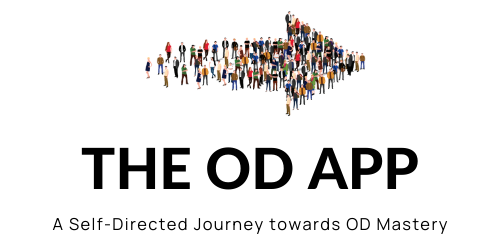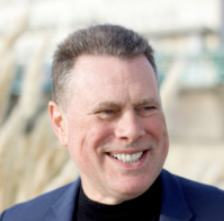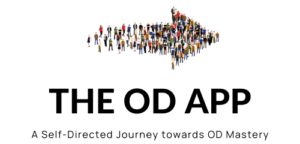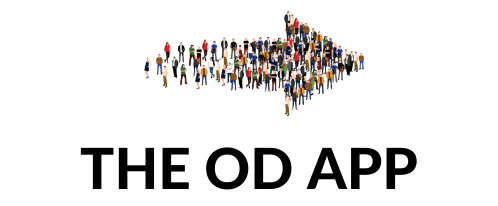Part I – From Engineering to Team Effectiveness Coaching
‘You can do things that I cannot do. I can do things that you cannot do. Together we can do great things.’
Mother Teresa
As a communications engineer in the Royal Air Force, my career direction changed dramatically in 2006. A timely self-awakening experience, as a participant on a leadership development programme, served as the catalyst for letting go of my engineering career anchor. The switch manifested itself firstly in the role of being an internal change consultant, and then as programme director of executive leadership team development, both within UK Defence.
In the case of the latter role, and re-energised by my new specialisation, I was fortunate to work with experienced coaches, facilitators, and chartered occupational psychologists, both external and internal to Defence, whose approaches and thought leadership excited me.
Soaking up the learning experience playing out before me, I witnessed first-hand the impact that such development could have on the functioning and effectiveness of executive teams. I found myself drawn increasingly to the face-to-face delivery side of the work and developed competence as a coach and facilitator, through formal learning and working, alongside many different and talented people on bespoke team effectiveness development interventions.
I attended the UK Organization Development Certificate Programme and graduated with Cohort 5, in 2012, leaving the Royal Air Force after 30-years’ service in December that same year to set up my own organization and leadership development practice.
Thus was born my fascination with, awareness of and understanding about the impact of Team Effectiveness Coaching.
Part II – Unpacking Team Effectiveness Coaching
‘Coming together is a beginning, staying together is progress, and working together is success.’
Henry T Ford
My experience has shown me that Team Effectiveness Coaching rarely has a single developmental focus. Once in conversation with a client around the development focus, the need turns out invariably to be many-factored and touching on different levels of intervention across the team.
In the context of Team Effectiveness Coaching, I find myself working mostly across at least 3 of these ‘levels of intervention’: intra-personal, inter-personal, intra-team and inter-team.
At its core, I would define Team Effectiveness Coaching as being about:
‘Enabling the team itself to create a safe space, constructed on a foundation of support and challenge, in which team members do this: reflect on how they work and learn together; and through dialogue can surface and act on the development focus needed to enhance the team’s performance and impact – this is their team effectiveness.’
An important feature of this definition for me is that it shows a link between development and reflection, introducing the concept of continual team learning as part of a learning cycle. To reinforce this with teams, I draw on Kurt Lewin’s 4 key stages shown in the graphic below.
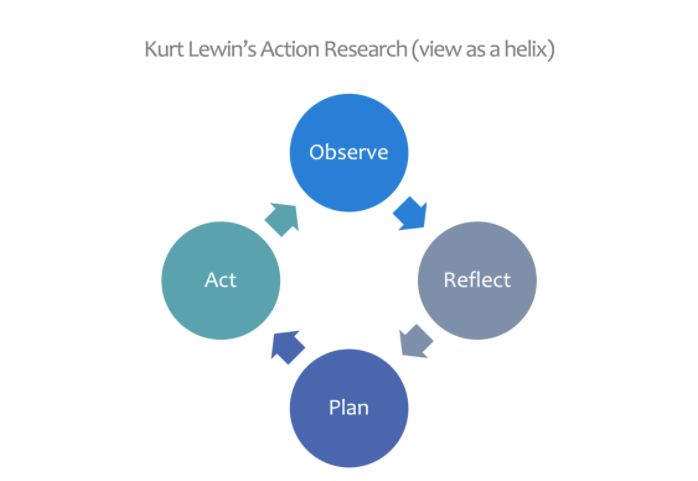
Always self-declared, I find that teams can describe themselves as being on a continuum ranging from dysfunctional to high-performing. For some teams, the margin for improvement can be quite small whereas for others it will be significant. Wherever a team positions itself on the continuum, they are seeking help to improve their effectiveness, invariably so that they can better navigate the challenging times that either they find themselves in or which lie ahead.
My mindset and approach towards Team Effectiveness Coaching is very much centred on supporting a team to be the best that they can be in their given context – ‘more than the sum of their parts’ as one client put it.
To this end, and as part of the relationship building and discovery, I encourage clients, through a coaching approach, to reflect on the purpose of the development – What are the purpose statements that will underpin the design of any development for the team? In this way, Team Effectiveness Coaching is shaped by the expressed words of the client – whilst some will have only one statement, others may have many. The purpose statements, though, can be amended or added to, along the way, considering any emergent development need. Thus, such purpose statements are always framed using the client’s words. By way of an example, the requirement underpinning Team Effectiveness Coaching might be expressed as follows:
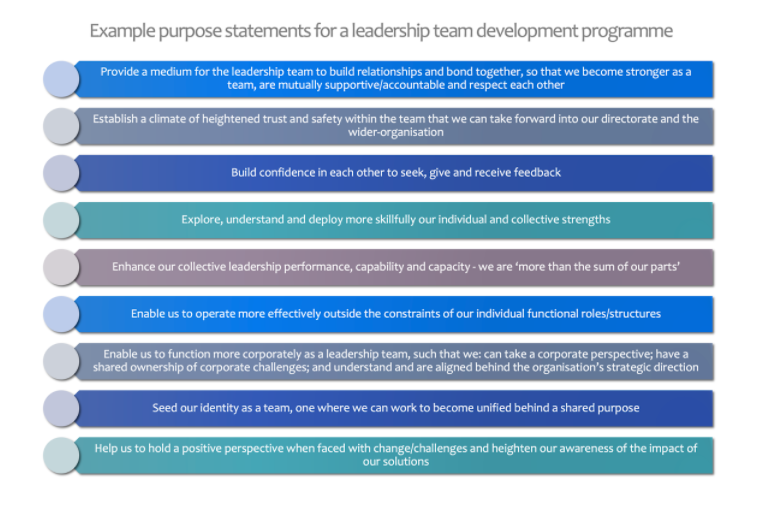
Part III – A Perspective on Core Requirements/Competences of the Team Effectiveness Coaching Professional
‘If the only tool you have is a hammer, you tend to treat everything as if it were a nail.’
Abraham Maslow
My intent here is to seed your curiosity around what to learn, what capability/competence to acquire and what capacity you want to develop personally.
For the purposes of this specialist contribution, I use the terms ‘Capabilities’, ‘Competencies’ and ‘Capacities’ as defined by Peter Hawkins (Leadership Team Coaching, 2011). He describes how ‘’capabilities’, like ‘competencies’, can be learnt and developed, they are about know-how’. He expands by stating that ‘competencies can be learned in the classroom, but capabilities can only be learned live and on the job’. On the other hand, he describes how ‘’capacities’ relate to one’s being, rather than one’s doing. They are human qualities that can be nurtured and refined’.
I compiled the table below of capabilities, competencies and capacities based on what I have found that I need to be able to call on in my role as a team effectiveness coach. It is not definitive, rather it is informed by my professional development, team effectiveness coaching experience, wider-reading and those who have influenced me.
| Serial | Core Professional Requirement(Capabilities/Competencies & Capacities)2 | Key Elements |
|---|---|---|
| 1 | Use of Self as Agent of Change (Capability/Capacity) |
Bringing your ‘presence’ to bear effectively, comprising:
|
| 2 | Emotional Intelligence (Capability/Capacity) |
|
| 3 | Knowledge (Competence/Capability) |
|
| 4 | Advanced Facilitation (Competence/Capability) |
|
| 5 | Responsible Courage (Capability/Capacity) |
|
| 6 | Coaching (Competence/Capability) |
|
| 7 | Feedback (Competence/Capability) |
|
| 8 | Group Process Consultation (GPC) (Competence/Capability) |
|
| 9 | Working at Different Levels of System (Competence/Capability) |
|
| 10 | Supervision (Capacity) |
|
| 11 | Consultancy (Competence/Capability) |
|
Part IV – Developing the Specialism & Valued Resources/Development Programmes
‘Learning without reflection is a waste. Reflection without learning is dangerous.’
Confucius
A Suggested Approach to Developing this Specialism
For an approach to developing the Team Effectiveness Coaching specialism, you might want to consider the following stages:
- Start by developing your facilitation skills and practise applying them in different settings, such as in team meetings or offering to run workshops
- Build your knowledge of team dynamics through wider reading, personal research, and attending appropriate development programmes
- Explore the range of issues that might impact team effectiveness (the graphic below offers a sample of those that I have come across in my work). Speak to colleagues and team leaders to discover their experience of what impedes and enhances team effectiveness
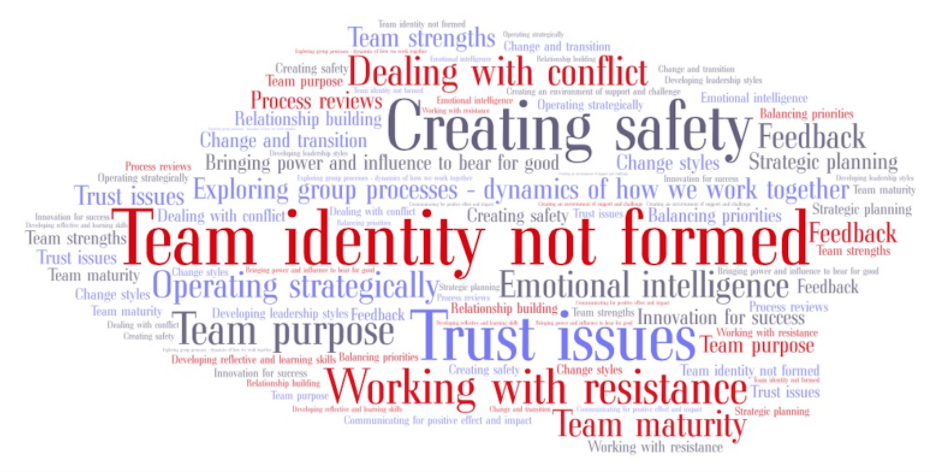
- Construct your own consultancy framework – test it out and seek feedback from a colleague
- Seek out someone skilled in team effectiveness coaching who can act as your supervisor and help you both to reflect on your experience and apply your learning
- Volunteer to work with a team to address effectiveness issues to build-up your experience – try out your consultancy framework too
- In the early stages of developing this specialisation, seek to build-up your team-effectiveness coaching experience by taking on projects (either as a volunteer or on a paid basis) that go beyond a standalone workshop
- As you become more skilled and confident, seek out team-effectiveness coaching assignments that offer the opportunity for a multifaceted programme of development (such as one comprising a series of development workshops addressing differing effectiveness issues, group process consultation sessions, and individual coaching)
Six Personal Thoughts
As you build experience, advance your skills, and grow in confidence, the following personal approach I take, in sustaining my own development in the specialisation, might be useful to hold in mind too.
1 – Seek Out What Energises You – Where is Your ‘Sweet Spot’?
When I started my practice in late 2012, I was very much the generalist, taking on all sorts of leadership and organization development assignments – some excited and stretched me professionally, and others sustained my business. It took several years and many different experiences to discover the type of work that energised me the most, and this very clearly centred on Team Effectiveness Coaching, working primarily at the intra-personal, interpersonal, and intra-team levels. So, take a deep breath and give it time to find your ‘sweet spot’.
2 – Enhance Your ‘Authority’ and Stay Humble
I have done much professional development along the way, including amongst others: the UK OD Certificate Programme, accredited executive coaching (through the Institute of Leadership and Management at the iCoach Academy), Introduction to Gestalt, Appreciative Inquiry, Strengthscope®/Hogan psychometrics, and as a volunteer facilitator with the Windsor Leadership charity. The people I have learned with, along the way, have inspired and influenced me in different ways, in both my professional and personal life. I have discovered that it is the essence of the people I have learned with that matters as much to me as the content of the development itself.
I say ‘humble’ as it has always been important for me to keep in mind that I will never stop learning. To support me in this, I remind myself routinely of a phrase I coined from martial arts, when I think I have mastered something, and that is to ‘Ditch the black belt and don the white one’!
3 – Grow and Nurture Your Relationships
Relationships and my network have been the lifeblood of my practice, to which I have invested energy, commitment, sincerity, and authenticity. Grateful to so many for connecting me to others, I have sought, in return, to carry this forward by connecting people in a similar way – this is perhaps one of the most fulfilling and important factors in sustaining me in my practice.
4 – Be Generous (Though Value Yourself)
A core part of my practice is to give back to society, and I do this through pro-bono work with charities – this ranges from one-to-one coaching, through volunteer facilitating, to Team Effectiveness Coaching. I share this in this context as these are important opportunities to develop competence and acquire experience beyond paid work.
Respect your knowledge and authority – you will have invested much into acquiring and developing this. It has taken me a while to achieve balance around what I give freely, such as my knowledge, my time, my fees. To this end, I have learned to give of myself to those causes where there is a strong connection, knowing that there will be a mutual benefit in one way or another.
5 – Experiment and Try Things Out
It took me a while to overcome the limiting beliefs that could creep in around trying things out for the first time. What has helped me along the way is to be an active member of two action-learning sets where I can test my thinking/approaches, seek out other ways of doing things, and reflect on how a particular intervention has played out.
I have found it helpful, also, to contract with the client if I am going to run something that is new or novel to my practice, seeking feedback on how it is experienced. This openness serves to enhance the relationship and trust with the client – it tells me, as well, the extent to which a client is prepared to experiment, and I always respect the boundaries that they set.
6 – Partner-up
Partnering-up – periodically with professionals that are different to me with different experiences and different approaches – has been a powerful way of stretching me personally and professionally. It does call for work to be done on interpersonal dynamics so that common ground can be found, we can remain in the service of the client team, and we can hold on, still, to what makes each of us who we are.
Some Recommendations – Resources | Development Programmes | Professional Bodies
A selection of resources that I value, that have influenced my practice in different ways, and that may be of interest include:
Leadership Team Coaching by Peter Hawkins
Wisdom of Teams by JR Katzenbach and DK Smith
Coaching the Team at Work by David Clutterbuck
Leadership That Gets Results by Daniel Goleman
Amongst the development programmes that I have valued and would value having worked with the founders, these include:
NTL UK Organisation Development Certificate Programme
Centre for Team Excellence (Jeremy Holt)
i-Coach Academy (Caroline Horner)
evosis and Courageous Inclusion (Alison France)
The professional bodies that I would commend include:
